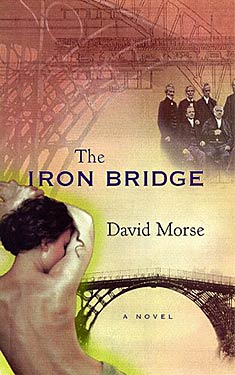
Added By: spoltz
Last Updated: Engelbrecht
The Iron Bridge
| Author: | David Morse |
| Publisher: |
Harcourt Brace Jovanovich, 1998 |
| Series: | |
|
This book does not appear to be part of a series. If this is incorrect, and you know the name of the series to which it belongs, please let us know. |
|
| Book Type: | Novel |
| Genre: | Science-Fiction |
| Sub-Genre Tags: | |
| Awards: | |
| Lists: | |
| Links: |
|
| Avg Member Rating: |
|
|
|
|
Synopsis
Maggie Foster takes a trip back through time to England, on the eve of the construction of the world's first iron bridge. To let the bridge be built and the Industrial Revolution to continue unbridled or to destroy the bridge and alter the course of history are among the dilemmas Maggie faces in this "richly evocative and fascinating piece of historical speculation" (Kirkus Reviews).
Excerpt
Maggie Foster: June 1773
Maggie caught her breath. She handed the baby back, out of some fear - not that she would drop it, but somehow from the intensity of her response; that was what frightened her. It came from too deep a place.
The old people had that same vitality. It showed in their hard edges, their mobile faces, warped postures; their tenacity bargaining at the Madeley market. Certain workers at Bedlam stood out sharply: the Clerk with his clean white stockings and curled wig; the one-armed man who operated the Newcomen engine; the big woman with the raucous voice and rust-streaked face who worked with the men breaking ore. There was a heartiness in all that idiosyncrasy, even among the wounded and the exploited. Maybe because they had a future.
Abraham Darby III: September 1775
From the moment he stepped off the Diligence onto the cobblestones of St. Paul"s Church Yard - Paul"s Yard, as Quakers preferred to call it - Abraham was distracted as always by the bold tempo of London, the vainglorious fashions: Wooden French heels painted bright red clicking past; ladies' wigs as tall as grenadiers' hats; enormous wheels of phaetons rolling past mounted on springs so absurdly high as to require an eight-foot ladder to climb into them; shop-windows filled with earthly temptations which he kept reminding himself he did not need. He kept his purse snugged to his breast, eyes alert. Still, while gawking he was nearly run over by a coach-and-eight arriving on the heels of the Cambridge machine. He was accosted by peddlers and by punks in soiled laces, jostled by chairmen, and proselytized by a ragged wild-eyed man reeking of lavender and rum who took a swipe at his hat and declared himself the last of the Ranters. "We know God by our sin!" the man cried, whirling in circles.
John Wilkinson: August 1775
"What is needed," chuckled Houliere, "is permanent war."
Wilkinson smiled grimly. The general had intended it facetiously; but this was the very concept that had begun to take shape in Wilkinson"s own mind after the Seven Years War ended and iron prices began to decline. "I am convinced, my friend," said Wilkinson, "I am convinced that in a future run by businessmen, this is exactly where 'tis all headed. Permanent War."
Copyright © 1998 by David Morse
Reviews
There are currently no reviews for this novel. Be the first to submit one! You must be logged in to submit a review in the BookTrackr section above.
Images
No alternate cover images currently exist for this novel.



















 Full Details
Full Details





